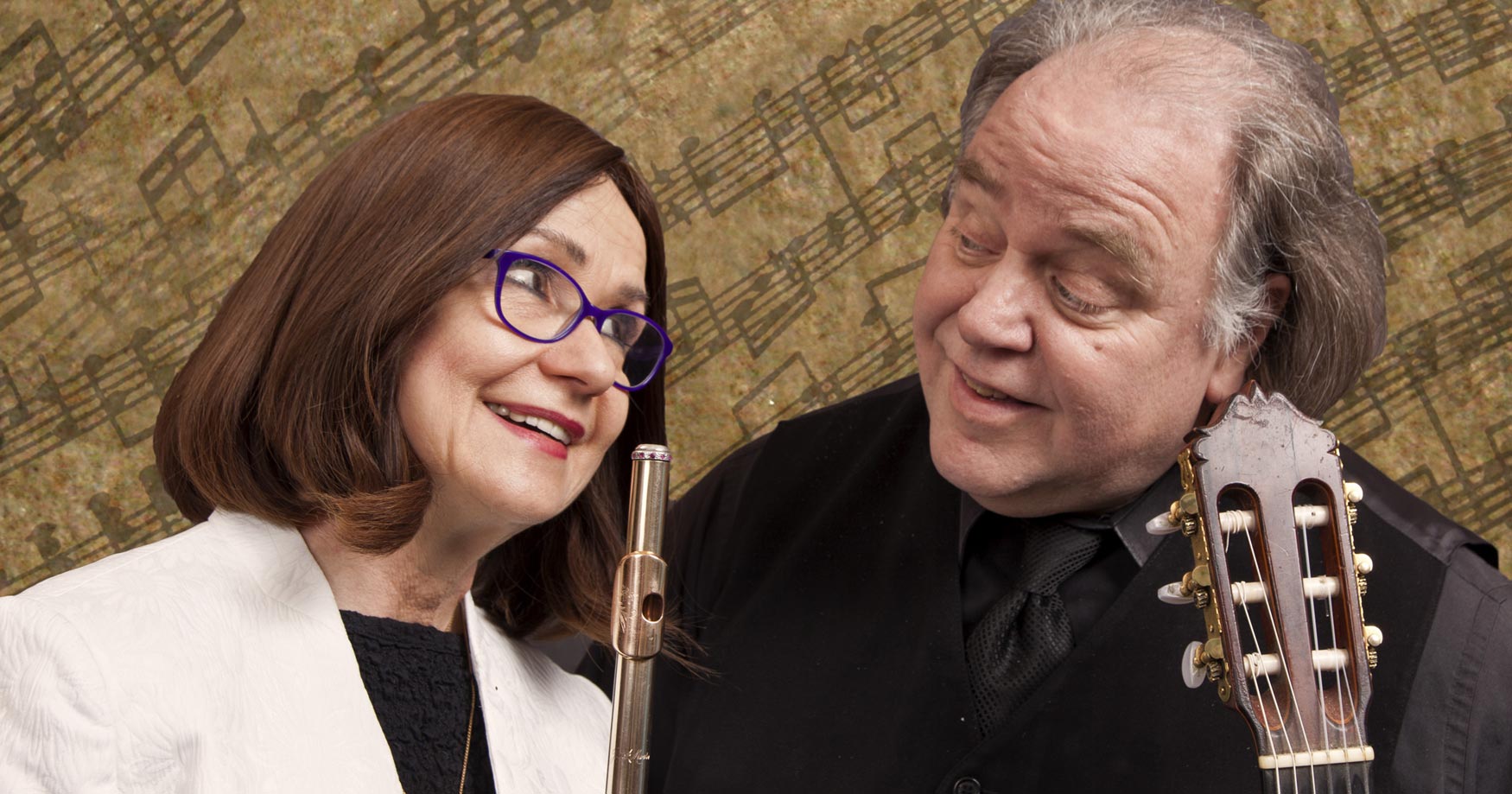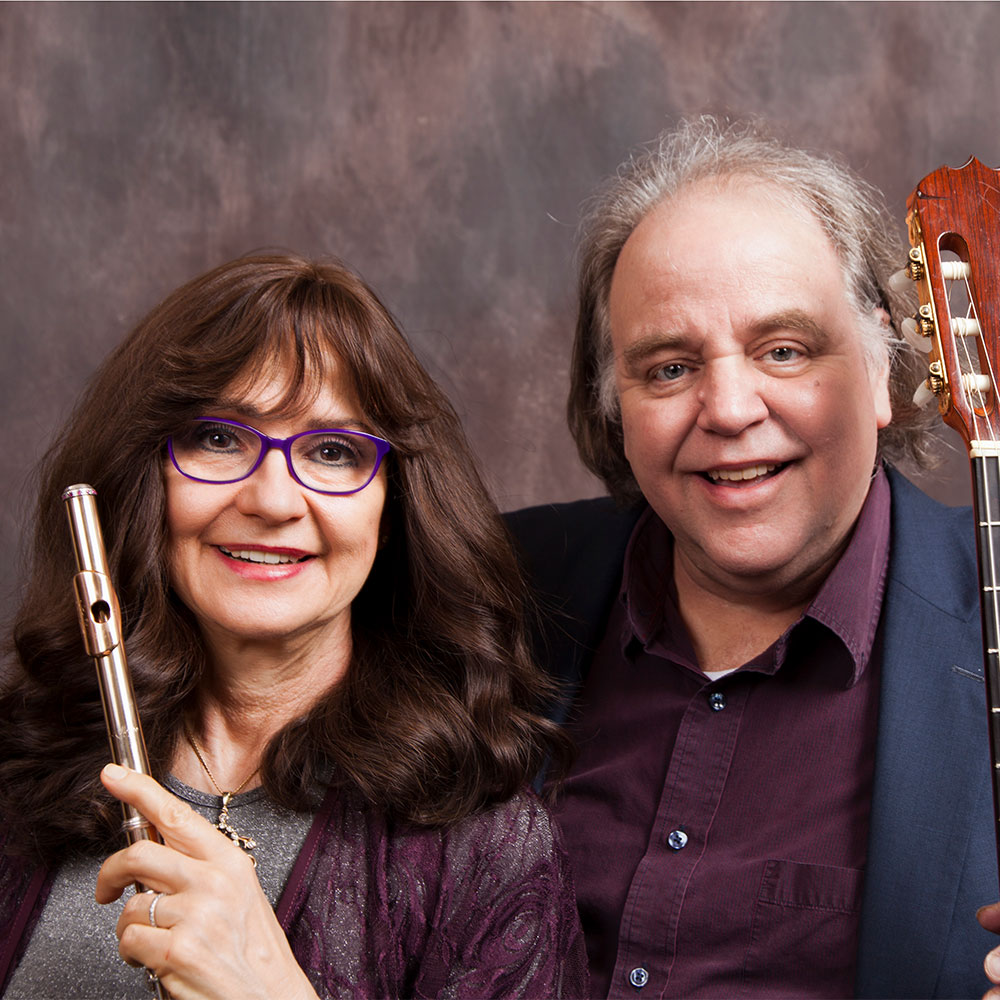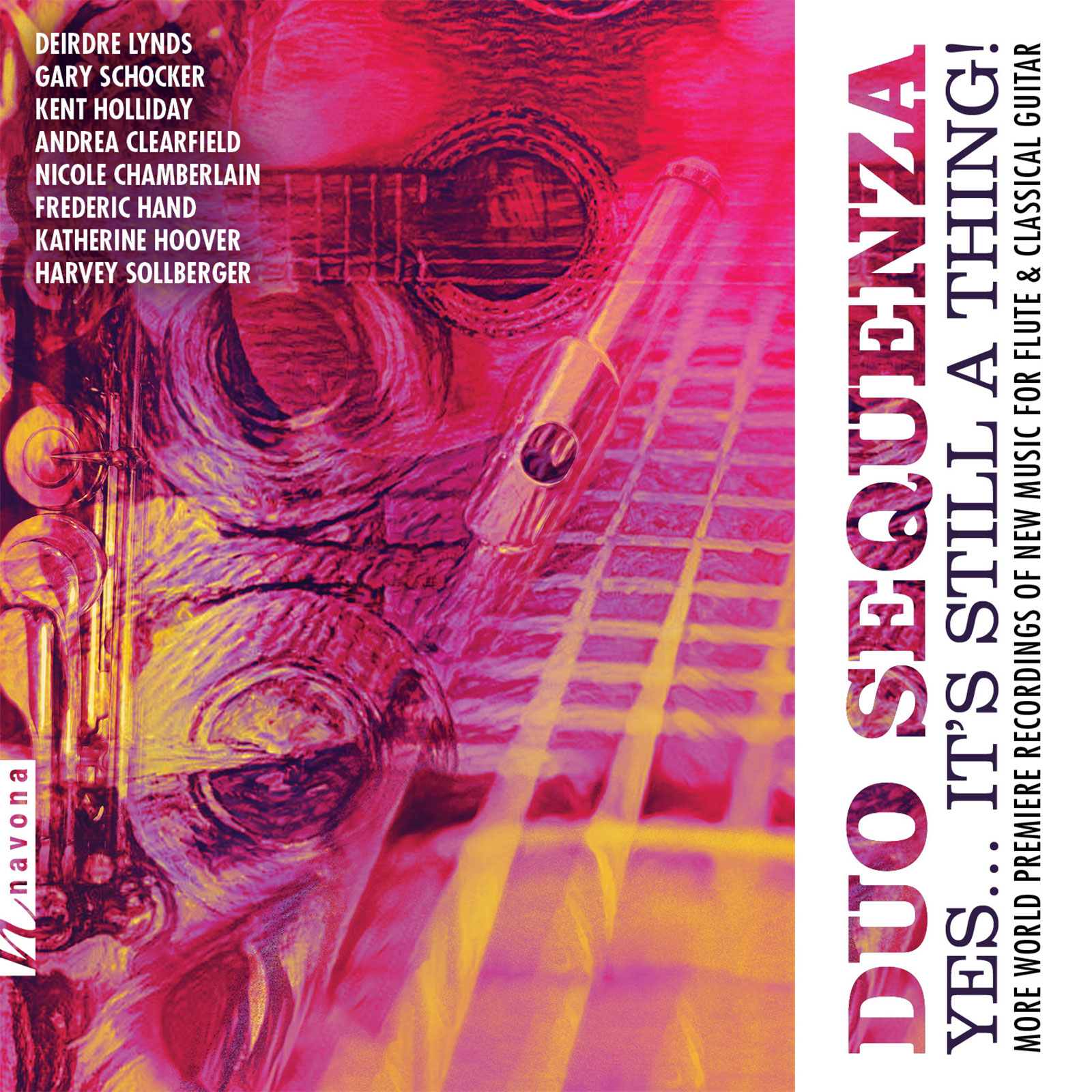
Following their Navona Records debut in 2019, Duo Sequenza returns with YES… IT’S STILL A THING!, a new program geared towards building new audiences for today’s classical music and promoting the work of living composers. Comprised of flutist Debra Silvert and classical guitarist Paul Bowman, Duo Sequenza brings an enchanting and harmonious quality that showcase the complementary capabilities of their respective instruments.
Today, Debra and Paul are our featured artists on “The Inside Story,” a blog series exploring the inner workings and personalities of our composers and performers. Read on to learn about how Paul hopes this album can act as a “masterclass” for the workings and enchantments of flute and guitar, and how Deb uses meditation as a tool to prepare for a performance…
Tell us about your first performance:
Paul: I was in 6th grade in a small town with two middle schools. That year, rezoning meant kids in my neighborhood were sent to a new middle school – away from the friends made in Elementary School. I played electric guitar, and was a budding tenor in the middle school choir. In an effort to impress the choir director, with whom I was quite smitten, I wanted to play the tune Misty by Errol Garner with her on piano, “laying down the changes,” as the hip cats say. Well, I lost my guitar pick right before the performance, and then later it was made a big deal of, simply because I recovered by finding the pick (which I was making by cutting the tops of the Cool Whip containers in the shape of a pick) and the performance was a memorable success.
Deb: I came to the flute rather late, at age 15, having had just several weeks of lessons in elementary band. I believe my first performance must’ve been on a float by the Women’s Christian Temperance Union, which my foster mother arranged. I remember wearing some kind of Revolutionary War costume. I’ve no idea what I played!
What was the first performance you remember seeing?
Paul: My older brother, two neighborhood kids, myself, and my dad all went to a rock concert in Chicago. I was just 10, and the rock groups were Humble Pie and Grand Funk Railroad. Coming from a rural Indiana town, my dad was a little concerned about coming to the big city. He brought with him his long-barrel 22 pistol. Since this took place at The Aragon Ballroom in Chicago, there were no seats, and the concertgoers mostly sat on the floor. There was the problem – a long barrel pistol stuck in my dad’s pants, while sitting on the floor. My poor dad!
Deb: I can’t remember what was played, but I was thrilled by my first attendance to a Buffalo Philharmonic concert when I was 16 and living in my foster home. Michael Tilson Thomas was conducting, and Cheryl Gobbetti, with whom I was studying at the time, was playing principal flute. I do recall some truly glorious flute playing, but for the life of me, I don’t know what pieces!
Do you have any specific hopes about what this album will mean to listeners?
Paul: I feel that listeners will experience a master-class in recording technique for the flute and guitar. The balance mix with the guitar sounding more “forward” while the flute incorporates more of the concert hall’s broader acoustic properties, makes this recording extraordinarily important.
Deb: I must concur with Paul on Alan Bise’s virtuosic recording technique. He has absolutely spoiled us with the quality of the sound he was able to capture. Colin Clarke of Fanfare said, “this is a beautifully performed and recorded recital. The ‘recorded’ part is important, as rarely has the sound of the flute been captured as well as here; the guitar, too, sounds present and beautiful.”
Beyond that, we wanted this program to offer something for everyone, and I think we’ve met that goal with the works we selected. Truly, the soundscape of flute and classical guitar offers so much in the way of technical and expressive possibilities. It really is “a thing” in chamber music and we hope more listeners will become enchanted with it. As with our previous release, these are all premiere recordings very worthy of a broad audience.
How do you prepare for a performance?
Paul: On the day of a performance, I generally have the instrument in my hands right up to the minute I go on stage. I need the tactile feel of the strings, and keeping the hands warm and fluid. Atrophy at this age sets in pretty quickly!
Deb: Oh yes, he does exactly that! I remember being in Singapore with two concerts to play a week apart. I was quite busy with the amazing shopping, while Paul stayed in the hotel room practicing what seemed like the entire time!
Generally, I take it pretty easy with actual practice on the day of performance. I sleep in, then do a little yoga, a lot of breathing, and very deeply meditative tonal and melodic work. I’ll follow that first hour running lightly through scales, just enough to warm up my fingers. I usually won’t work on any passages from the performance, and it’s pretty rare that the two of us would do any rehearsing the day of the concert.
What are your other passions besides music?
Paul: My personal relationships are the most applicable passion to guitar playing in terms of the singular focus I bring to making music. I enjoy the sweeter moments with my girlfriend, and consider our relationship deserving of the attention and desire to build a solid foundation – just like spending time on one work, a hard passage therein, a tricky rhythm or many attentive nuances.
Deb: I’m definitely passionate about my family. My husband has been unfailingly supportive throughout my entire musical career and so forgiving of the hundreds of meals not made, tons of laundry left undone, and monster dust bunnies that have lived with us over the years! We’re a multi-generational household now with my son, his wife, and our 4-year-old granddaughter, and we’ll have another grandchild by the time this is published. They provide the back-up care for my 30-year-old daughter with autism, blindness, and medical fragility. Without them, there’d be no way forward for me musically. My other two daughters live nearby, and I have a 2-year-old granddaughter by the youngest and her husband. I adore them all and feel very blessed. Beyond that, I’d say I’m a compulsive overreader; I typically read 3-5 books at a time!
Who are your musical mentors?
Paul: My most valuable mentor is featured on this recording – flutist/composer/conductor Harvey Sollberger. As my academic advisor at U.C. San Diego, Harvey was the consummate musical partner in performance; the sagacious professional in career advice with an encyclopedic memory of New Music, its adherents, and important historical references and stories that fully rounded out my musical education and enriched my knowledge of New Music Performance.
Deb: I must say virtually every great musician I’ve had the privilege to work with has served me as a mentor in one way or another, especially Paul, whose musicianship is just incomparable. Far beyond the actual time I’ve spent with many other fine artists, I often find myself remembering and reflecting on something or another from my time with them. Composers would have to include Ralph Shapey, Katherine Hoover, and Jonathan Leshnoff. Flutists Peter Lloyd and William Bennett still talk to me quite a lot in my head, and my principal teachers, Geoffrey Gilbert and Mary Louise Poor continue to coach me from the Great Beyond. I’ve also learned and been deeply inspired by simply listening to other flutists, instrumentalists (especially string players) and vocalists; too many to even begin to list.

Duo Sequenza’s passion is to build new audiences for today’s classical music and promote the work of living composers. The duo has toured extensively, premiering American new music throughout the United States, Asia, and Europe. Lauded as "… brilliant, gossamer, and completely engaging…a delight to hear..." by Arts Indiana Magazine, they have been honored with invitational performances at the 21st Century Guitar Conference, Flute New Music Consortium Festival, Mid-Atlantic Flute Festival, National Flute Association Convention, and others. Award-winning adjunct projects, composer collaborations, and residencies augment their impact on today’s classical music, as have more than 20 new works written for them.

